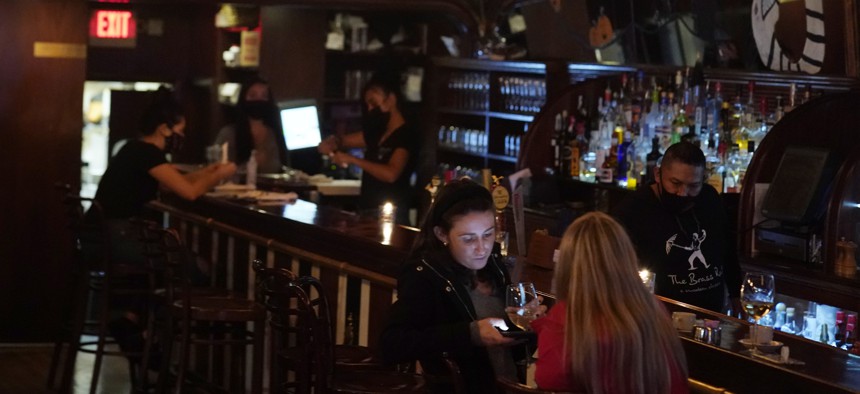States Need Federal Money to Do the Right Thing

A bar in Hoboken, New Jersey, on November 11, 2020. AP Photo/Seth Wenig
COMMENTARY | Bailing out bars and restaurants would allow them to remain closed—and curb the spread of the coronavirus.
Americans are now learning what happens when the federal government fails to provide economic security during a public-health crisis: Individuals, businesses, and local leaders make dangerous decisions in a futile attempt to preserve their economies or their livelihood.
From a public-health standpoint, it is obvious that states should close down indoor restaurants and bars. These establishments are particularly dangerous when it comes to the spread of Covid-19: In the front of the house, diners sit elbow to elbow, taking off their mask to eat and talk and drink; in the back of the house or behind the bar, workers stand shoulder to shoulder, preparing food, plating, mixing drinks, and washing dishes. This puts patrons at risk, and servers and cooks and bartenders at even more risk. This risk is made even more intense by cold weather, which has made outdoor dining and drinking infeasible in much of the country.
A recent study by the Centers for Disease Control and Prevention found that Covid-19-positive outpatients at 11 health-care facilities were twice as likely to have eaten at a restaurant recently than people who tested negative. And new research published in Nature found that certain types of establishments—restaurants, gyms, hotels, and places of worship—were potent loci of super-spreader events, with full-service restaurants being “particularly risky.” Four times as risky as gyms, in fact.
[Read: Why Americans really go to the gym]
Local officials know these facts; businesses know them too. But getting in the way of the obvious public-health move is the reality that the federal government has done nothing—a miserable, unforgivable, death-and-destruction-inducing nothing—since the spring, when the Paycheck Protection Program provided establishments with forgivable loans to keep their lights on. That money is long gone, and no aggressive federal public-health policy or extended stimulus has taken its place. As a result, many state and local governments have had little choice but to let restaurants stay open or reopen at reduced capacity, not enough to bring the industry back but more than enough to keep spreading the coronavirus around. To try to keep patrons and workers safe, the businesses themselves have had to set up plastic dining igloos, install ventilation systems, and rejigger their operations—all expensive investments that might end up being for naught.
The situation is existential for restaurants. As of August, consumer spending on them was down by a third compared with last year, and the National Restaurant Association is projecting that casual noodle joints, Michelin-starred establishments, and everything in between will lose out on $240 billion in sales this year. Some 2.3 million food-service jobs have evaporated, and one in six restaurants have closed, either permanently or for a long hiatus. Two in five restaurants report that they will not make it another six months, if current conditions persist (conditions that are getting worse!). The situation is existential for thousands of people too.
The answer is obvious: Bail out state and local governments. Bail out the restaurants and bars. Bail out workers. Bail out everyone. Put somewhat more academically: In this strange and awful pandemic, economic stimulus is a neglected and underutilized public-health tool that improves the decision architecture for all actors, from individual households and workers to private businesses to government officials.
Start with individuals. The pandemic has proved true over and over again what was already well known: that income and wealth are protective when it comes to health. Having a savings account to dip into or a considerable salary to rely on means having the ability to say no to an ill-advised work outing to an indoor restaurant or a Saturday-night shift in a too-crowded bar. Having a $600 boost to your unemployment-insurance checks or a sudden $1,200 in your pocket means being able to turn down a frontline job if you have a preexisting health condition, or being able to walk away from a workplace where people refuse to wear masks. More direct stimulus for families now will mean better decision making during this deadly surge.
[Annie Lowrey: America chose sickness and lost the economy]
The same is true for businesses. Bailing out bars and restaurants would let them remain closed, or allow them to survive while operating on a safer takeout-and-outdoor-dining-only model. Cutting checks to gyms and yoga studios would let them welcome fewer patrons, and help them install ventilation systems and other effective safety equipment.
At the state and local level, this logic applies again: Federal cash would alleviate the pressure on local officials to speed up the reopening of risky businesses and institutions, and would provide them with money to invest in parklets, sanitation equipment, hotels for quarantine, space to house unhoused residents, better test-and-trace infrastructure, spaced-out classrooms, and so on.
Given the risk that indoor dining and drinking poses, a niche bill to help restaurants and bars makes sense: The RESTART Act and the RESTAURANTS Act are both options floating around in Congress. So, too, does more mass, unrestricted stimulus. Cash to families, companies, cities, and states would not just help the ailing economy and the slowing recovery. It would help end the pandemic.
Annie Lowrey is a staff writer at The Atlantic, where she covers economic policy.
NEXT STORY: Feds Shoot Down Pennsylvania Plan to Funnel Virus Relief Money to School Districts





